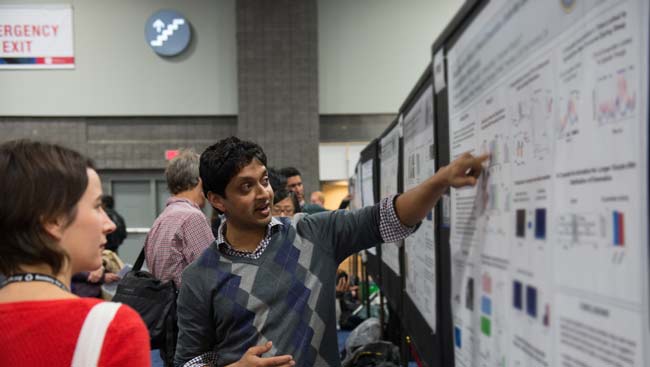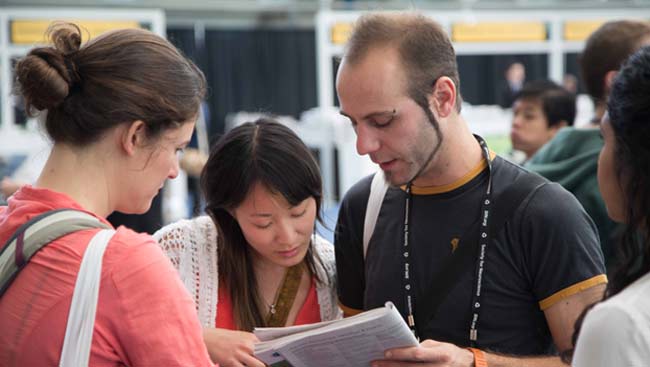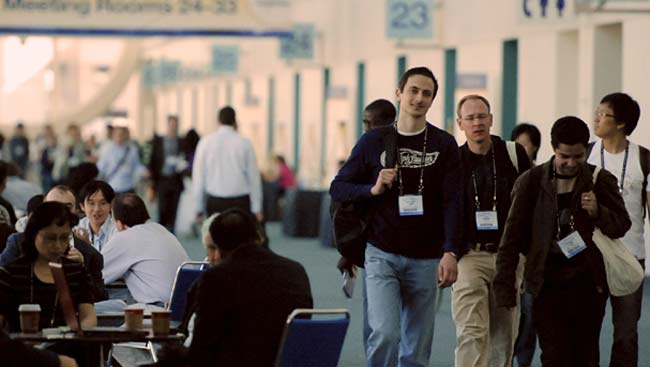Attendees’ Best Advice for a Successful SfN Conference
- Featured in:
- Advice for SfN’s Annual Meeting

Are you getting ready for Neuroscience 2015? Maximize your time with these steps recommended by previous attendees.
Participate in a variety of activities.
“Make the most of it. You want to get the best experience out of coming. SfN is a pretty lengthy meeting, so get as many workshops and posters in, stay up on as much research, mingle, and get to know people. But also, have fun. Find something to do, meet people, but — science. You’re here for the science, so keep that in mind.”
-Brittany Butler, PhD, Master of Science in Patent Law candidate at the University of Notre Dame
Meet with people with whom you work long-distance
“It’s one of the only conferences where all our collaborators are around, so it’s a really good opportunity to put a face to a name of all the people you’ve been working with or emailing with for different projects.”
-Danielle Sambo, PhD candidate at the University of Florida
Find out what’s happening outside of your area of expertise.
“Because it is such a large meeting, there’s the chance to move outside of your discipline. It’s often really interesting to hear about areas that are perhaps at the border of what you’re interested in but that will really take you outside of your envelope. You learn so many new things at this meeting.”
-David Bilkey, PhD, professor at the University of Otago
Set reasonable expectations for yourself. Don’t feel pressured to attend every poster session.
“The first time I came, I tried to go to every poster that I wrote down. I had a huge list and, over time, I’ve sort of scaled back. I would be happy if I could understand two posters per session, either for morning or afternoon. And I think that’s really helped to allow me to get a really detailed understanding of the science that’s happening.”
-Yin Li, MD-PhD candidate at the University of Pennsylvania School of Medicine
Discover new technologies that can have a real impact on your research.
“What really interests me about coming back is when you see new technologies so there [are] new ways to look at your research like, for example, looking at the new kinds of microscopes now and the way you can do image analysis of different things which we couldn’t do a couple of years ago. There’s that on the one hand, and there [are] things of electrophysiology where you can do batch analysis of neurons and you can do electrophysiology on a large scale with high throughputs — this kind of technology did not exist before. So yeah, every time I come I see something new, something different which gives me a new idea of how to approach research.”
-Ebrahim Mayat, PhD, Ebrahim Mayat & Company
Plan your activities around how your career is evolving.
“What you look for in the meeting changes a lot. When you first start coming, most of what you’re interested in relates directly to you. How can I make my research better? What are other people doing that’s directly related to me? Now, I come and want to almost absorb as much information as possible. I go to a lot of talks that have nothing to do with what I do just because I think it’s interesting or something’s new and exciting in research. Now I’m doing a lot of mentoring of other students —showing them around, what to do, what not to do.”
-Richelle Mychasiuk, PhD, Alberta Children’s Hospital Research Institute, University of Calgary
Learn from scientists at all career stages.
“It is really interesting in terms of the latest developments and what people are interested in. There’s a variety of people presenting — not just senior PIs but PhD students and postdocs. It’s good to know that people at different stages of their careers are doing incredible work and presenting it. That is encouraging.”
-Deniz Vatansever, PhD candidate at the University of Cambridge
Soak up the inspiration and excitement.
“It is inspiring, really. You’re learning about all of these things that are happening and can’t wait to get back to the lab to do more experiments. When you’re here, you’re constantly being inspired and thinking of new things to do, thinking of new ways to do it, and thinking about all of the experiments that you want to do when you get back.”
-Johnnie Moore-Dodson, PhD, postdoctoral research associate at the University of Arizona
Comments adapted from interviews conducted at SfN’s Neuroscience 2014.
What advice do you have to get the most out of SfN’s annual meeting? Share in the comments.





.png?h=1763&w=3125&la=en&hash=B2439C2768576BED6405672E5CD5CF8CB1AA375F)




